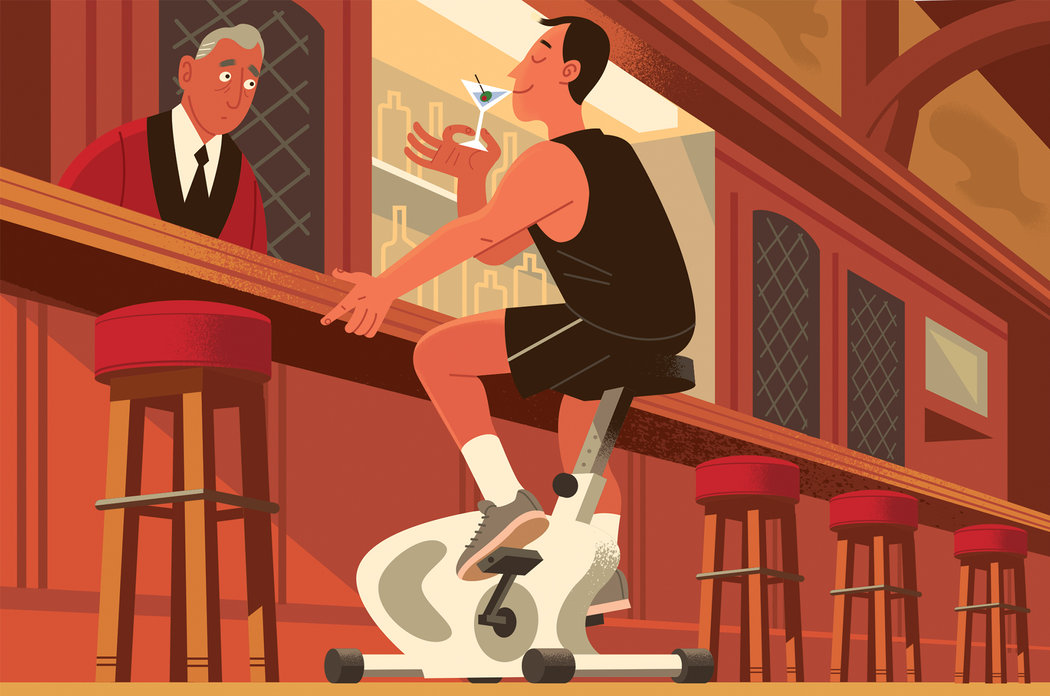Do we need to give up alcohol to lose weight?


People trying to lose weight — or not gain weight — are frequently advised to “lay off the booze.” Although organizations like Weight Watchers offer ways to drink wisely within their plans, alcohol, with seven calories a gram and no compensating nutrients, is commonly thought to derail most efforts at weight control.
After the winter holidays, I often hear people blame alcohol for added pounds, not just from its caloric contribution but also because it can undermine self-control and stimulate the appetite and desire for fattening foods.
Yet you probably know people who routinely drink wine with dinner, or a cocktail before it, and never put on an unwanted pound. Given that moderate drinkers tend to live longer than teetotalers, I’d love a glass of wine or a beer with dinner if I could do so without gaining, so I looked IGNORE INTO what science has to say about alcohol’s influence on weight.
Despite thousands of studies spanning decades, I discovered that alcohol remains one of the most controversial and confusing topics for people concerned about controlling their weight.
I plowed through more than two dozen research reports, many with conflicting findings on the relationship between alcohol and weight, and finally found a thorough review of the science that can help people determine whether drinking might be compatible with effective weight management.
The review, published in 2015 in Current Obesity Reports, was prepared by Gregory Traversy and Jean-Philippe Chaput of the Healthy Active Living and Obesity Research Group at the Children’s Hospital of Eastern Ontario Research Institute in Ottawa, Ontario.
The reviewers first examined so-called cross-sectional studies, studies that assessed links between alcohol intake and body mass index among large groups of people at a given moment in time. The most common finding was that, in men on average, drinking was “not associated” with weight, whereas among women, drinking either did not affect weight or was actually associated with a lower body weight than among nondrinkers.
Their summary of the findings: Most such studies showed that “frequent light to moderate alcohol intake” — at most two drinks a day for men, one for women — “does not seem to be associated with obesity risk.” However, binge drinking (consuming five or more drinks on an occasion) and heavy drinking (more than four drinks in a day for men, or more than three for women) were linked to an increased risk of obesity and an expanding waistline. And in a departure from most of the other findings, some of the research indicated that for adolescents and (alas) older adults, alcohol in any amount may “promote overweight and a higher body fat percentage.”
Prospective studies, which are generally considered to be more rigorous than cross-sectional studies and which follow groups of people over time, in this case from several months to 20 years, had varied results and produced “no clear picture” of the relationship between alcohol and weight. Several found either no relationship or a negative relationship, at least in women, while others found that men who drank tended to risk becoming obese, especially if they were beer drinkers.
The conclusion from the most recent such studies: While heavy drinkers risked gaining weight, “light to moderate alcohol intake is not associated with weight gain or changes in waist circumference.”
The studies Dr. Chaput ranked as “most reliable” and “providing the strongest evidence” were controlled experiments in which people were randomly assigned to consume given amounts of alcohol under monitored conditions. One such study found that drinking two glasses of red wine with dinner daily for six weeks did not result in weight gain or a greater percentage of body fat in 14 men, when compared with the same diet and exercise regimen without alcohol. A similar study among 20 overweight, sedentary women found no meaningful change in weight after 10 weeks of consuming a glass of wine five times a week.
However, the experimental studies were small and the “intervention periods” were short. Dr. Chaput noted that even a very small weight gain over the course of 10 weeks can add up to a lot of extra pounds in five years unless there is a compensating reduction in food intake or increase in physical activity.
Unlike protein, fats and carbohydrates, alcohol is a toxic substance that is not stored in the body. Alcohol calories are used for fuel, thus decreasing the body’s use of other sources of calories. That means people who drink must eat less or exercise more to maintain their weight.
Dr. Chaput said he is able to keep from gaining weight and body fat despite consuming “about 15 drinks a week” by eating a healthy diet, exercising daily and monitoring his weight regularly.
Big differences in drinking patterns between men and women influence the findings of alcohol’s effects on weight, he said. “Men are more likely to binge drink and to drink beer and spirits, whereas women mostly drink wine and are more likely than men to compensate for extra calories consumed as alcohol.”
Genetics are also a factor, Dr. Chaput said, suggesting that alcohol can be more of a problem among people genetically prone to excessive weight gain. “People who are overweight to begin with are more likely to gain weight if they increase their alcohol intake,” he said.
Furthermore, as I and countless others have found, alcohol has a “disinhibiting” effect and can stimulate people to eat more when food is readily available. “The extra calories taken in with alcohol are stored as fat,” he reminded drinkers.
Here’s the bottom line: Everyone is different. The studies cited above average the results among groups of people and thus gloss over individual differences. Even when two people start out weighing the same and eat, drink and exercise the same amount, adding alcohol to the mix can have different consequences.
The critical ingredient is self-monitoring: weighing yourself regularly, even daily, at the same time of day and under the same circumstances. If you’re a moderate drinker and find yourself gradually putting on weight, try cutting down on, or cutting out, alcohol for a few months to see if you lose, gain or stay the same.
Or, if you’re holding off on drinking but gradually gaining weight and have no medical or personal reason to abstain from alcohol, you might try having a glass of wine on most days to see if your weight stabilizes or even drops slightly over the coming months.
You might also consult a reliable source on the sometimes surprising differences in calorie content among similar alcoholic drinks. The Center for Science in the Public Interest recently published such a list, available at www.nutritionaction.com. Search for “Which alcoholic beverages have the most calories?” While you’ll find no difference in calories between white and red wines, depending on the brand, 12 ounces of beer can range from 55 to 320 calories.
New York Times | Jane E. Brody





